The Hitchhiker's Guide to the Galaxy
 for thematic elements, action and mild language.
for thematic elements, action and mild language.
Reviewed by: Michael Karounos
CONTRIBUTOR
| Moral Rating: | Offensive |
| Moviemaking Quality: |
|
| Primary Audience: | |
| Genre: | Sci-Fi Adventure Comedy |
| Length: | 1 hr. 50 min. |
| Year of Release: | 2005 |
| USA Release: |
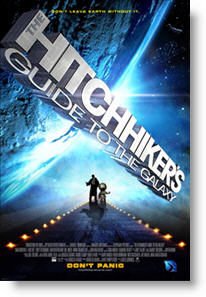
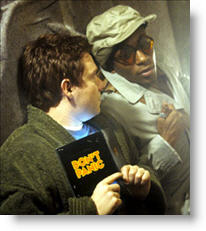
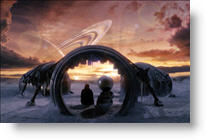
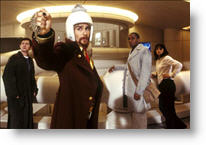
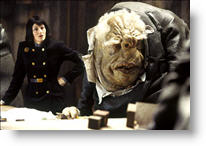
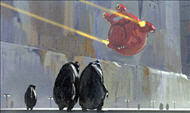
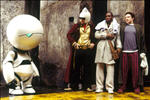
Materialism—What if the cosmos is all that there is? Answer
Extraterrestrials—Are we alone, or is there lots of life elsewhere in the universe? Answer
Bible and ETs—What does the Bible say about intelligent life on other planets? Answer
Does Scripture refer to life in space? Answer
Does God really exist? How can we know? If God made everything, who made God? Answer
Where did life come from? Is evolution really the best scientific answer? Answer
| Featuring |
|---|
| Martin Freeman, Mos Def, Sam Rockwell, Zooey Deschanel, Bill Nighy |
| Director |
|
Garth Jennings |
| Producer |
| Gary Barber, Roger Birnbaum, Nick Goldsmith, Jay Roach, Jonathan Glickman, Todd Arnow |
| Distributor |
“Don’t Panic”
The best part of seeing “Hitchhiker’s Guide to the Galaxy” occurs in what appears to be the opening sequence. We see a beautiful cloud-and-water-covered Earth swirling on its white and blue axis in outer space. We drift with it to the sublime voice of Louis Armstrong singing “It’s a Wonderful World.” When the Earth violently blows up into a zillion pieces, a sign reading “DON’T PANIC” reassuringly displays on the screen, and we calmly think: “This is good.”
The dissonance between cultured music and outrageous juvenile destruction on a cosmic scale strikes the sick funny bone in the same way as the image of Robert Duvall in “Apocalypse Now” surfing a wave of explosions in his helicopter and blaring Wagner from over-sized speakers: it’s just right.
Only later do you begin to panic, when you recall that the sequence was actually the trailer to “Chicken Little” and that “Chicken Little” looked like a better movie. Belatedly, you realize that you’re stuck with stupid acting, stupid writing, and stupid directing—praying for Robbie and Mr. Smith to find the humor that has been lost in space.
The fact that far worse movies have been made than “Hitchhiker’s Guide to the Galaxy” is no consolation—if it’s the worst movie one can remember seeing recently.
I read the first volume in the series and admit that the characters, the incidents, and the fantastic details are accurate. What’s missing is the soul of the book. The book’s humor is a complex blend of imagination and tone. Adams writes cleverly, but it’s his droll authorial voice that makes him so funny. He writes satire by diminishment, a mannerism which doesn’t work on the screen, because movies work in reverse: they have to make everything larger than life.
Adams’ genius is belittlement. In the movie, diminishing the characters makes them out to be idiots who are neither funny nor interesting.
“Hitchhiker” uses voice-over narration, but this may be one of those rare movies that would have benefited from more voice-over, a lot more, so the audience could at least hear something funny and intelligent. Stupid characters cannot communicate funny ideas because they sound like people talking about what they don’t understand. That’s sad.
Additionally, the movie relies on too many close-ups of puzzled facial expressions. In those cases, it would have been better to say what was left unsaid. Intelligence is even more difficult to communicate without words than it is with words.
For those who haven’t read the book, the plot is as follows. Arthur Dent’s home is scheduled for demolition to make room for a highway bypass. Arthur hadn’t been notified of this fact personally, but the paperwork had been available in the town archives, had he only chosen to look. Similarly, Earth is scheduled for demolition and, like Arthur’s house, the paperwork had been on file, open to appeal for a long time, though no one on Earth knew this or could travel to a distant solar system to file the appeal, even if they had known it.
Both Arthur’s house and the Earth are destroyed by mindless bureaucrats, but, luckily, Arthur hitches a ride with an alien, and they set off on their galactic adventures. The faux violence that ensues is on the level of “Teenage Ninja Mutant Turtles”: improbable, unconvincing, and unfunny. The actors overact in these parts, which shows that they know the movie’s in trouble, and that they have to work harder to get laughs where they can.
The dual demolitions are a funny conception because they articulate the perversity of an unseen fate which decides, in the interest of mindless improvement, to destroy a house and a planet full of life. There are at least three obvious references to Darwin and evolution in the movie. Likewise, there are at least three references to religion—representing its spokesperson, adherents, and practices as hopelessly ignorant.
The President of the Galaxy and the religious leader are similar in their rock persona excesses; while the scientist is coolly practical in her oversize glasses and starchy logic. We see three little animated books with a voice-over saying in succession: “Where God Went Wrong”; “More of God’s Errors”; and, “Who Is This God Person Anyway?”
There are also poorly written sops to gays and feminists which fill out the film’s politically correct liturgy. Clearly, Jenkins interprets Adams’s books polemically, and he works hard to insert these lame, ideological winks and nudges into the screenplay for the benefit of a certain kind of audience who he hopes will say good things about the movie. Unfortunately, the film is so convincingly stupid that everything exists on the same low level. In terms of communicating the soundness of its ideas, the movie comes across like a box of rocks, shaken, not stirred.
Adams’ book suggests a tension between the totalitarianism of the Vogon’s mindless bureaucracy, and the capitalistic greed of Zaphod’s materialism. In this, the book has intriguing similarities to Aldous Huxley’s Brave New World in which the drug soma represents a central metaphor of a different kind of escapism. Had Jenkins strengthened the intellectual underpinning of the movie to suggest that life offers two unacceptable choices—totalitarianism and materialism—and the only alternative is to escape, it could have been thought-provoking.
The Vogons, like the creatures in Orwell’s Animal Farm, appear to be a cross between pigs and humans. Additionally, Zaphod’s theft of the spaceship The Heart of Gold has allegorical dimensions, as does the ship’s Infinite Probability Drive. But lacking ideas, what’s a hapless Earthling like Arthur Dent to do?
For the answer to that question and other painful thoughts, by all means, see this movie. However, if you wish to preserve your IQ at its present level, DON’T PANIC. Take a walk in the park instead. It’s a wonderful world.
Violence: Minor / Profanity: None / Sex/nudity: Minor
See list of Relevant Issues—questions-and-answers.


I didn’t think it was possible to make such a mess of such a great story with what appeared to be a perfect cast. Still, that’s what they did. Here’s what they did wrong:
They tried to cram two books into one movie, so they fused many events from the book together very clumsily, and tacked on a happy ending that was never there before and just makes you sick to your stomach. All the bits from the book that made me cry with laughter were either skipped through and thrown away, or just entirely omitted.
I found myself laughing only because I was remembering bits from the books. All of the original theological philosophy is gone, replaced with weak attempts at making 3 year olds laugh. (e.g: cute little crabs that make cute little squeaking noises and more often than not come to not so cute little endings.)
Don’t watch this. It will put you off the books. The 70’s film versions are better. The costumes and special effects are horrendous, but they keep to the text and capture the comedy very well. See them instead. (Excuse my Australian spelling. I am, in fact, Australian.
Better than Average/1½
In this film version, there are many slapstick additions to help maintain the nonsensical PG rating (children do not generally read these books, why are they the film’s target demographic?!), but much of the humor originally derived from the above listed topics is now found in pure, unfunny silliness.
Unfortunately, while the filmmakers trimmed down the religious and evolutionary satire, they retained enough of it (as well as adding more in the form of John Malkovich) to make the film unsuitable for a Christian audience and unpleasing to fans of the book.
Great performances (especially Sam Rockwell as Zaphod), and visually stunning, but a sad letdown for all parties involved.
Offensive/3
The movie is surprising clean, with little to push it beyond a G, much less a PG, rating. There’s very little off-color language and no inappropriate sexual situations that I can think of.
From a Christian perspective, the lack of truthful answers regarding the meaning of life, why we’re here, and any sense of eternal ramifications, is disappointing… but I expected that going into the theater. You have to remember that the book doesn’t just come out of left field with it’s quirky humor, it comes out of the bleachers! The book doesn’t offer truthful and Godly answers to any eternal truths… hey, the true meaning of life is 42! So don’t look for any Biblical perspectives regarding those issues.
For teens and adults, it’s a fun movie that I’d rate a 4 out of 5. However, if you take younger kids to see it, make sure you discuss those “eternal” questions with them afterward, and give them the true Biblical perspective regarding those “questions of life.” Actually, it presents a great opportunity to share God’s eternal truths with any non-believer who sees the movie.
And don’t be surprised if folks show up with towels at the theater. Like “The Rocky Horror Picture Show”, this movie lends itself to that type of wacky interaction with the audience. And according the The Hitchhiker’s Guide, a towel is the most important possession in the universe. Uhhhhhh… don’t ask.
Better than Average/4
Extremely Offensive/1
Before going to the theatre, I knew it was a sci-fi movie and satirical, but that’s about ALL I knew about it. I’m usually pretty informed on a movie’s contents before seeing it, but this was a very spur-of-the-moment event with a friend, and I didn’t have time to learn anything about it. Seeing this movie was the idea of my son and one of his friends because in their words “the previews look funny.” (Exactly what the producers wanted, I’m sure, but… Christian parents beware!)
It was rated PG, so me and a friend took our kids in to see it, feeling fairly “safe.” At the beginning of the movie, the narrator makes several references to the main character being an “ape-descendant.” Shortly afterward, the main character is shown at a costume party and meets his love interest, who is dressed up as Darwin. It’s very evident that Darwinism and evolution are being presented which is not uncommon and not real “shock” material. However, I was appalled when the narrator begins explaining to the viewer WHAT “The Hitchhikers Guide to the Galaxy” is. To paraphrase: It’s a “hugely popular book.” More popular than the three best selling books ever: 1) “Mistakes God made,” 2) “Bigger Mistakes God Made” and 3) “Who is this God Person Anyway?”
That did it for me. I was appalled and shocked by the BLATANT blasphemy. I think I expected a lot of tongue-in-cheek, sci-fi silliness but certainly nothing like this. That’s about all I can tell you. I just felt I needed to do what I can to warn other Christians what to expect so you can decide if it’s something you want to see or subject your children to and not be as caught off guard as I was.
Extremely Offensive/3
As a Christian, there are a FEW offensive moments in the movie: one being the mention of Oolon Coloophid’s trilogy on God which has already been talked about here.
I was pleasantly surprised by this telling of the tale and glad they stuck by the late Douglas Adams’s screenplay, written over 20 years ago (originally he had wanted to cast Bill Murray for the role of Slartibartfast, but Murray was too busy making “Ghost Busters”!)
And before anybody complains that the ending was changed to make it a happy one, remember that this was only the first part of the tale. The original book ended right where the movie did—with our heroes on their way to Milliways: The Restaurant at the End of the Universe.
Oh, and if you haven’t seen it yet, keep your eyes peeled for the original Marvin suit from the BBC miniseries! If you HAVE already seen the movie and missed this, go buy a new ticket or wait for the DVD.
Average/3½
I think one of the main thrusts of this movie is our own perspective and how that colors the way we interact with others around us and the choices we make. This is found in the demolition on two different scales, the whale falling, the mice and the gun. Possibly more. My message to my kids is that we need to try to see things from God’s perspective and not our own, because our own is so colored by our sin nature.
Average/4
Very Offensive/3
It even answered a few questions that all the other incarnations never do—like why does Ford Prefect save Arthur Dent in the first place?
The movie does make fun of an imaginary religion, but most of the time real religions deserve to be made fun of. Given that Douglas Adams by the end of his life was a strong evolutionist and self-proclaimed “convinced” atheist—the mention of evolution was much more subtle than I expected. And the joke about “God” trilogy of books is just as much making fun of best-selling novels (if not more so) than poking fun at God.
This is a fun movie—that’s great for a laugh and great for getting a discussion going. FYI the joke that the answer to life the universe and everything is 42—what other kind of answer would a computer give?
Better than Average/4
Offensive/1
Extremely Offensive/1
Very Offensive/1½
However, since God does not require proof, as it undermines faith, the very existence of the fish then proves God does not exist. (To paraphrase greatly). The actual point of the joke was not to denigrate God but to show that we humans can be too clever for our own good. Unfortunately, the film slimmed down the joke to the point where it became meaningless. I hope this helps.
Good/4
What I saw “spiritually” was although the 2 hitchhikers escaped the destruction of planet Earth—they were still alive and they used their “guide” to keep them safe in their endless journey. Their “guide” was sort of like the Bible—that helped them in their journey—their roadmap—in their endless adventurous journey. And in the end Mr Dent gets his house back, locks up all the monsters in a trailer and everything was honky dorey. Good scenery and some special effects of space etc. The movie is geared for little kids rather than adults. Kinda cute.
Average / 1½
The movie, wasn’t as funny as the book (they never are), but it was hilarious in it’s own right. I laughed out loud along with my friends, and otherwise shared some insider’s chuckles. The film is not only funny, it’s good science fiction. While it struggles to grasp the enormity and epic scale so prevalent in the book, it captures the whimsy to a T.
The movie looks fantastic! There is a seamless blend of live action puppetry enhanced by the CG effects so often abused in today’s summer lineups. The Vogons are not CG, and the consequential limitations on physical movement contribute to their ridiculousness. Whoever designed the character Marvin The Paranoid Android deserves an Oscar for something. His chronic attitude problem is perfectly manifested in his inanimate expression. No matter what Marvin does, his physicality makes him both funny and cute. You just want to run up and hug him.
I’m not entirely sure that Douglas Adams’ masterpiece is anti-God. Adams obviously wasn’t a Christian, but his stories seem to go back and forth between universal chaos and the possibility of a higher deity (albeit a far away one, with an unfortunate sense of humor). He’s not for it, or against it. In one scene however, that was not in the book, there is an extended period of church mocking. Some Christians may find it amusing, some may see it as offensive.
Content-wise, it wasn’t terrible. It had one scene meant to be mock-horror which struck me as macabre, and some sexual undertones, but that was it. The makers of the film obviously loved the book (it is my understanding that Douglas Adams himself worked on the screenplay before his death in 2001), and it shows-from the fantastic opening sequence, to the thrilling (if not anti-) climax. You can imagine them jumping around behind the camera being positively giddy saying “I can’t believe we’re getting paid to do this!!!”
Average/4
Better than Average/4
For a movie of it’s genre, and from a book written by a very anti-God author, I was rather pleased by the lack of nudity, sex and swearing (though I think there was a little) in the movie. I found it an enjoyable way to spend an afternoon, and highly recommend it to all Nerds and Geeks alike. However, if you do go, do not forget your towel!
Better than Average/3½
Very Offensive / 1½
Better than Average/0
Extremely Offensive/2
Average/2½
Good/5
Tip #1: Before going to see this bizarre, far-out movie of manic depressant robots and planet building home bodies,I suggest that you read the first of Douglas Adams’ “The Hitchhiker’s Guide to the Galaxy” five-setter series. I say the first one cause it’s the foundation for what you can look forward to when you see the film.
Tip #2: I warn you that if you have strong opinions against evolution, then I would suggest saving your money and rent yourself a movie from your local Blockbuster’s or Hollywood Videos store. Throughout the movie,there are lots of references to it. So if you hate evolution with a passion, then save your money for a rainy day.
Tip #3: Humor thrives abundantly from beginning to end,though some of it just plain ridiculous. You never know what words are going to fly from the tongue of each character. So you are relatively kept wondering what the heck anyone is going to say or even do.
Tip #4: Neither worry nor anxiety need be held if you’re curious about the usage of profanity or adultery-related scenes. As far as I remember, there wasn’t much cussing nor any sexual scenes. Hats off to that!
Tip #5: Lastly, I must be honest and tell you how extremely chaotic this movie was. It switched from scene to scene without any true connection. I had a slight headache by the end of the movie.
Overall, I feel neutrally about this movie. I can’t really say I felt positive about the spending of my bucks on this movie. But I can’t really say it sucked. Remember this is just my opinion. Save your money or spend it. It’s your choice.
Average/4
Better than Average/3½
Better than Average / 2½
Good/4
Offensive/3½
Better than Average / 4½
Average / 4


On a Christian level, the message of the movie is that there is no point to “life, the universe, and eveything.” Definitely the worst adaptation of the famed book.
My Ratings: Offensive/2